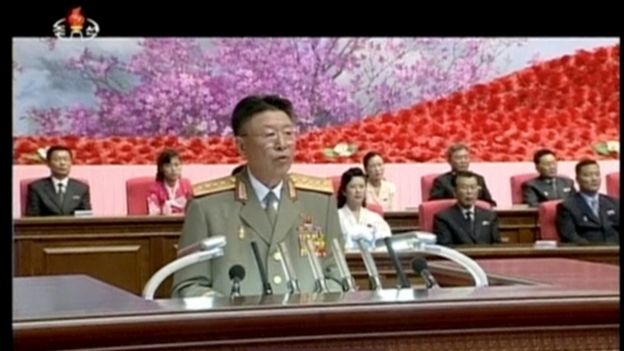
North Korea's military chief Ri Yong-gil has been executed, according to South Korean reports.
He was last seen in early January alongside the North's leader Kim Jong-un during a test of what the secretive Communist state called a hydrogen bomb.
North Korea watchers noted his absence from a more recent high-profile satellite launch, having featured routinely alongside Kim Jong-un in official media reports of military events since his appointment in August 2013.
But what do we know about him?
'Trusted' colleague
According to South Korea's Yonhap news agency, close observers of developments in the North say he first emerged as a senior staff officer in 2012 before taking over from chief of staff and reputed hardliner Kim Kyok-sik, who had a chequered career.
The Chinese media have tracked his career at the top closely.
Hong Kong's Wen Wei Po newspaper said General Ri already "stood in for Kim Kyok-sik" at a powerful Central Military Commission meeting in May 2013.
China's official Xinhua news agency noted his "position of seniority" during the promotion of General Hwang Pyong-so to vice marshal in April 2014, saying the new vice marshal ranked "second only to People's Army Chief of Staff Ri Yong-gil... and Defence Minister Jang Jong-nam", with Ri considered to be "Kim Jong-un's number two in the military".
North Korea's state media have always presented General Ri as a loyal "senior executive" in the army and a "trusted" colleague in the government.

As well as being a key figure in Kim Jong-un's entourage, he has also been a prominent public advocate of the consolidation of the country's military power.
The official KCNA news agency reported his presence alongside Kim Jong-un at the August commemoration of the death of state founder Kim Il-sung, noting the homage of senior officers "improves army loyalty and consolidates the leadership system".
His last high-profile appearance in the state media was on 5 January's "inspection of coastal artillery", during which the alleged hydrogen bomb was tested.
'Seeking privileges'
Then all was quiet until Yonhap quoted "informed sources" in the North as saying General Ri was executed in early February for "factionalist and authoritarian corruption".
These unnamed sources thought it likely that he died shortly after the 2-3 February ruling Korean Workers' Party and army joint committee meeting.
His name was missing from official coverage of the meeting, such as the Rodong Sinmun newspaper report, which instead flagged up the presence of former security police chief Ri Myong-su.
Yonhap thought it unusual that Rodong Sinmun should omit Ri Yong-gil's name, given that Kim Jong-un had "trusted him enough to make him a candidate member of the Political Bureau of the Workers' Party".
But there was one indication in the unusually opaque state media that all was not going well for the chief of staff.
KCNA reported from the same meeting chaired by Kim Jong-un that an "in-depth discussion" had "mainly criticised the practices of seeking privileges, misuse of authority, abuse of power and bureaucratic culture manifested in the party, and proposed tasks and ways for thoroughly overcoming them".



No comments:
Post a Comment